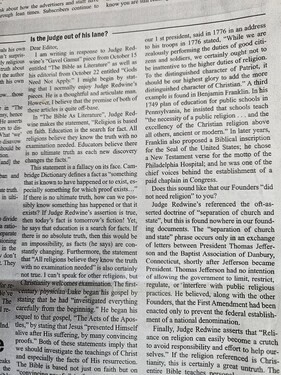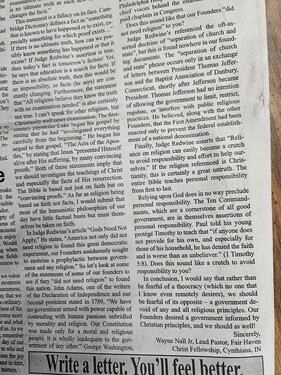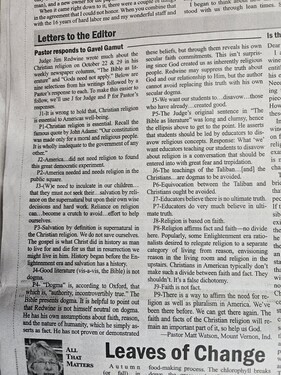Letter To The Editor
Our local paper, the Posey County News, recently featured two columns written by a retired judge from our area. Both of these articles carried the theme that religion should stay out of our government and our schools. After praying, I felt that the Holy Spirit would have me respond to these in what I hoped would be a kind and loving way...My response was printed in the paper this last week along with a response from another local pastor. Here is my letter, for those who might be interested in reading it... (BTW the title that was given to this letter was "Is the Judge Out of His Lane?" The newspaper chose to give it that title. The phrase appears nowhere in my letter.)
October 31, 2024
Dear Editor,
I am writing in response to Judge Redwine’s “Gavel Gamut” piece from October 15 entitled “The Bible as Literature” as well as his editorial from October 22 entitled “Gods Need Not Apply.” I might begin by stating that I normally enjoy Judge Redwine’s pieces. He is a thoughtful and articulate man. However, I believe that the premise of both of these articles is quite off-base.
In “The Bible As Literature”, Judge Redwine makes the statement, “Religion is based on faith. Education is the search for fact. All religions believe they know the truth with no examination needed. Educators believe there is no ultimate truth as each new discovery changes the facts.” This statement is a fallacy on its face. Cambridge Dictionary defines a fact as “something that is known to have happened or to exist, especially something for which proof exists…” If there is no ultimate truth, how can we possibly know something has happened or that it exists? If Judge Redwine’s assertion is true, then today’s fact is tomorrow’s fiction! Yet, he says that education is a search for facts. If there is no absolute truth, then this would be an impossibility, as facts (he says) are constantly changing. Furthermore, the statement that “All religions believe they know the truth with no examination needed” is also certainly not true. I can’t speak for other religions, but Christianity welcomes examination. The 1st-century physician Luke began his gospel by stating that he had “investigated everything carefully from the beginning.” He began his sequel to that gospel, “The Acts of the Apostles,” by stating that Jesus “presented Himself alive after His suffering, by many convincing proofs.” Both of these statements imply that we should investigate the teachings of Christ and especially the facts of His resurrection. The Bible is based not just on faith but on “convincing proofs.” As far as religion being based on faith not facts, I would submit that most of the humanistic philosophies of our day have little factual basis but must themselves be taken on faith.
In Judge Redwine’s article “Gods Need Not Apply,” He states, “America not only did not need religion to found this great democratic experiment, our Founders assiduously sought to enshrine a prophylactic between government and any religion.” So let’s look at some of the statements of some of our founders to see if they “did not need religion” to found this nation. John Adams, one of the writers of the Declaration of Independence and our 2nd president stated in 1789, “We have no government armed with power capable of contending with human passions unbridled by morality and religion. Our Constitution was made only for a moral and religious people. It is wholly inadequate to the government of any other.” George Washington, our 1st president, said in 1776 in an address to his troops in 1776 stated, “While we are zealously performing the duties of good citizens and soldiers, we certainly ought not to be inattentive to the higher duties of religion. To the distinguished character of Patriot, it should be our highest glory to add the more distinguished character of Christian.” A third example is found in Benjamin Franklin. In his 1749 plan of education for public schools in Pennsylvania, he insisted that schools teach “the necessity of a public religion . . . and the excellency of the Christian religion above all others, ancient or modern.” In later years, Franklin also proposed a Biblical inscription for the Seal of the United States; he chose a New Testament verse for the motto of the Philadelphia Hospital; and he was one of the chief voices behind the establishment of a paid chaplain in Congress. Does this sound like that our Founders “did not need religion” to you?
Judge Redwine’s referenced the oft-asserted doctrine of “separation of church and state”, but this is found nowhere in our founding documents. The “separation of church and state” phrase occurs only in an exchange of letters between President Thomas Jefferson and the Baptist Association of Danbury, Connecticut, shortly after Jefferson became President. Thomas Jefferson had no intention of allowing the government to limit, restrict, regulate, or interfere with public religious practices. He believed, along with the other Founders, that the First Amendment had been enacted only to prevent the federal establishment of a national denomination.
Finally, Judge Redwine asserts that “Reliance on religion can easily become a crutch to avoid responsibility and effort to help ourselves.” If the religion referenced is Christianity, this is certainly a great untruth. The entire Bible teaches personal responsibility from first to last. Relying upon God does in no way preclude personal responsibility. The Ten Commandments, which are a cornerstone of all good government, are in themselves assertions of personal responsibility. Paul told his young protégé Timothy to teach that “if anyone does not provide for his own, and especially for those of his household, he has denied the faith and is worse than an unbeliever.” (1 Timothy 5:8). Does this sound like a crutch to avoid responsibility to you?
In conclusion, I would say that rather than be fearful of a theocracy (which no one that I know even remotely desires), we should be fearful of its opposite – a government devoid of any and all religious principles. Our Founders desired a government informed by Christian principles, and we should as well!
Sincerely,
Wayne Nall Jr
Lead Pastor
Fair Haven Christ Fellowship
Cynthiana, IN
October 31, 2024
Dear Editor,
I am writing in response to Judge Redwine’s “Gavel Gamut” piece from October 15 entitled “The Bible as Literature” as well as his editorial from October 22 entitled “Gods Need Not Apply.” I might begin by stating that I normally enjoy Judge Redwine’s pieces. He is a thoughtful and articulate man. However, I believe that the premise of both of these articles is quite off-base.
In “The Bible As Literature”, Judge Redwine makes the statement, “Religion is based on faith. Education is the search for fact. All religions believe they know the truth with no examination needed. Educators believe there is no ultimate truth as each new discovery changes the facts.” This statement is a fallacy on its face. Cambridge Dictionary defines a fact as “something that is known to have happened or to exist, especially something for which proof exists…” If there is no ultimate truth, how can we possibly know something has happened or that it exists? If Judge Redwine’s assertion is true, then today’s fact is tomorrow’s fiction! Yet, he says that education is a search for facts. If there is no absolute truth, then this would be an impossibility, as facts (he says) are constantly changing. Furthermore, the statement that “All religions believe they know the truth with no examination needed” is also certainly not true. I can’t speak for other religions, but Christianity welcomes examination. The 1st-century physician Luke began his gospel by stating that he had “investigated everything carefully from the beginning.” He began his sequel to that gospel, “The Acts of the Apostles,” by stating that Jesus “presented Himself alive after His suffering, by many convincing proofs.” Both of these statements imply that we should investigate the teachings of Christ and especially the facts of His resurrection. The Bible is based not just on faith but on “convincing proofs.” As far as religion being based on faith not facts, I would submit that most of the humanistic philosophies of our day have little factual basis but must themselves be taken on faith.
In Judge Redwine’s article “Gods Need Not Apply,” He states, “America not only did not need religion to found this great democratic experiment, our Founders assiduously sought to enshrine a prophylactic between government and any religion.” So let’s look at some of the statements of some of our founders to see if they “did not need religion” to found this nation. John Adams, one of the writers of the Declaration of Independence and our 2nd president stated in 1789, “We have no government armed with power capable of contending with human passions unbridled by morality and religion. Our Constitution was made only for a moral and religious people. It is wholly inadequate to the government of any other.” George Washington, our 1st president, said in 1776 in an address to his troops in 1776 stated, “While we are zealously performing the duties of good citizens and soldiers, we certainly ought not to be inattentive to the higher duties of religion. To the distinguished character of Patriot, it should be our highest glory to add the more distinguished character of Christian.” A third example is found in Benjamin Franklin. In his 1749 plan of education for public schools in Pennsylvania, he insisted that schools teach “the necessity of a public religion . . . and the excellency of the Christian religion above all others, ancient or modern.” In later years, Franklin also proposed a Biblical inscription for the Seal of the United States; he chose a New Testament verse for the motto of the Philadelphia Hospital; and he was one of the chief voices behind the establishment of a paid chaplain in Congress. Does this sound like that our Founders “did not need religion” to you?
Judge Redwine’s referenced the oft-asserted doctrine of “separation of church and state”, but this is found nowhere in our founding documents. The “separation of church and state” phrase occurs only in an exchange of letters between President Thomas Jefferson and the Baptist Association of Danbury, Connecticut, shortly after Jefferson became President. Thomas Jefferson had no intention of allowing the government to limit, restrict, regulate, or interfere with public religious practices. He believed, along with the other Founders, that the First Amendment had been enacted only to prevent the federal establishment of a national denomination.
Finally, Judge Redwine asserts that “Reliance on religion can easily become a crutch to avoid responsibility and effort to help ourselves.” If the religion referenced is Christianity, this is certainly a great untruth. The entire Bible teaches personal responsibility from first to last. Relying upon God does in no way preclude personal responsibility. The Ten Commandments, which are a cornerstone of all good government, are in themselves assertions of personal responsibility. Paul told his young protégé Timothy to teach that “if anyone does not provide for his own, and especially for those of his household, he has denied the faith and is worse than an unbeliever.” (1 Timothy 5:8). Does this sound like a crutch to avoid responsibility to you?
In conclusion, I would say that rather than be fearful of a theocracy (which no one that I know even remotely desires), we should be fearful of its opposite – a government devoid of any and all religious principles. Our Founders desired a government informed by Christian principles, and we should as well!
Sincerely,
Wayne Nall Jr
Lead Pastor
Fair Haven Christ Fellowship
Cynthiana, IN



Recent
Archive
2024
November
2023
No Comments